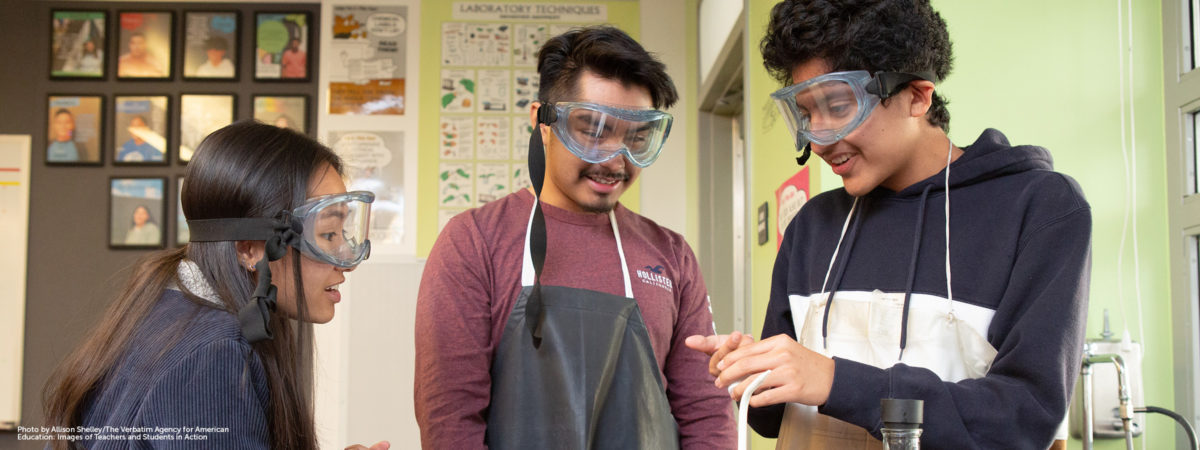
December 2, 2020 | By Kevin McElhaney
High-quality resources and curricula can help educators bring science to life through authentic and challenging activities. What research do we need to bring standards-aligned science learning to more students and support educators in implementing these resources effectively?
OpenSciEd is expanding its available suite of materials to offer a high-quality, multi-year, NGSS-aligned curriculum sequence and supporting resources. As an open educational resource, OpenSciEd is under an open license for people to use, remix, and share. As such, OpenSciEd has several unique benefits relative to typical, commercially produced instructional materials. For instance, it is available at no cost to schools and districts and has the potential to expand access to engaging, authentic science experiences to K-12 students who otherwise would not receive such learning opportunities. Additionally, open resources can be adapted to meet the needs of specific districts or communities, and these adaptations can be shared with other communities with similar needs. OpenSciEd will also support research in unique ways. For example, because open materials can be readily modified, research studies can compare adapted lessons to their off-the-shelf counterparts to examine the effectiveness of the adaptations.
In deciding to adopt OpenSciEd curriculum materials, school districts will seek research evidence that backs their selection. Further, research studies can guide districts to strengthen their implementation of the curriculum materials. The science education community needs rigorous research that examines the potential of OpenSciEd to improve outcomes and identify what steps schools and districts that adopt OpenSciEd should take to realize this potential.
The Digital Promise team, with support from the Carnegie Corporation of New York, is organizing a wide range of stakeholders—including STEM education designers, researchers, teachers and administrators, and program officers—to collaboratively develop and launch an OpenSciEd Research Agenda that attends to issues of equity in science education. We are engaging individuals with a range of experience in science education, from research to design to implementation, because listening to diverse perspectives and expertise will lead to high-impact, actionable research.
Through a series of virtual convenings, workshops, and working groups, this community will generate multi-dimensional, equity-centered research questions. These questions will address student learning, teacher professional development, implementation quality, technology, and assessment, and they will inform practical solutions for key subgroups of under-resourced students, families, and educators. The convenings will help the community articulate promising research questions, establish appropriate methodological approaches, and form productive partnerships. Rigorous research on OpenSciEd can help the science education community answer questions about the equitable design of materials, student outcomes, effective and equitable classroom teaching practices, teacher professional development approaches, and models for school adoption and adaptation that address the specific needs of their students. These findings have the potential to advance the knowledge, skills, and practices that educators need not only to support student growth in science, but also to support our students in contributing meaningfully to society as citizens. The research agenda and community stand to accelerate the research timeline and stimulate a wide range of research projects addressing these critical needs.
Our goal is to help researchers frame important research questions, form powerful research teams, write compelling proposals, and ultimately to receive funding from federal or philanthropic sources to conduct the research that is needed to grow the OpenSciEd movement.
To do this, we’re excited to bring together a growing OpenSciEd research community that is inclusive, collaborative, and well-rounded in expertise. We welcome diverse perspectives, and strongly encourage people of color and early-career educators and researchers to join. By joining the community, you can connect with like-minded partners, and be notified about convenings, workshops, and opportunities to contribute to our research agenda. We’ll also share news about available resources, potential research funding opportunities, and open calls for proposals.
Visit our webpage to stay informed about upcoming OpenSciEd Research Community happenings and opportunities.
By Tamara Tate and Pati Ruiz
By Judi Fusco and Beverly Yeadon